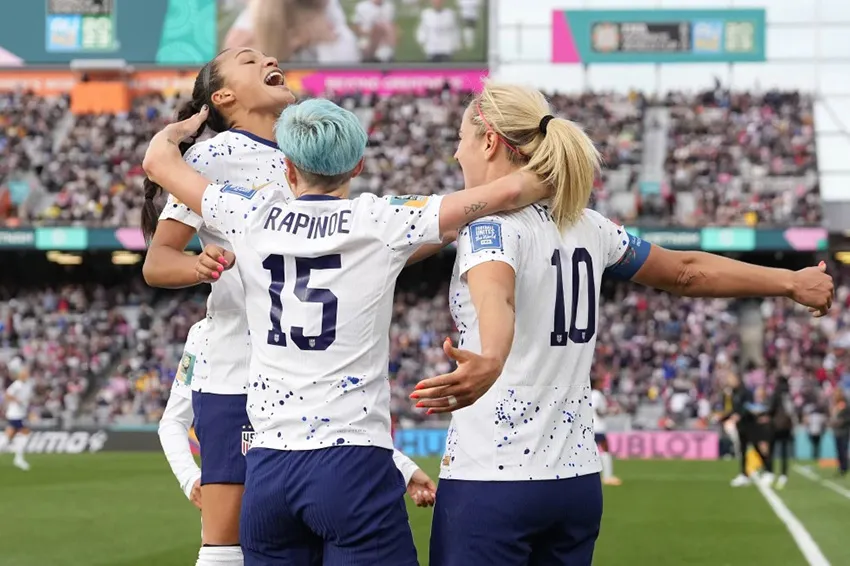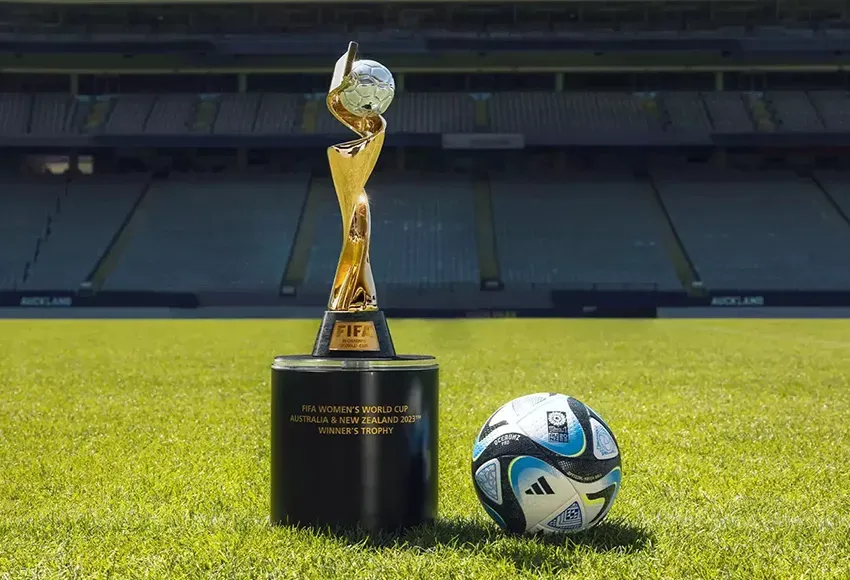On Thursday, July 20, Australia and New Zealand kicked off their first-ever joint World Cup. The countries are hosting a record 32 nations in the largest women's soccer tournament.
Not only that, the 2023 tournament has the most LGBTQ+ athletes in history. According to GLAAD, a record 91 LGBTQ+ players are competing in the monthlong event, which has something for all Queer fans to enjoy, from amazing athleticism to forbidden romances.
Players to watch out for
Home team Australia has the most Queer athletes, with 40% identifying as LGBTQ+. Some of the most prominent include forward Hayley Rasso, winger Caitlin Ford, defender Ellie Carpenter, and forward Sam Kerr.
Not only are Carpenter and Kerr two of Australia's players to watch out for, but they're also dating competitors! Carpenter is currently in a relationship with Danielle van de Donk, a player for the Dutch national team. Outside of the World Cup, the two are both on the football club Olympique Lyonnais in France.
Kerr is also in a "forbidden relationship" with US star Kristie Mewis. Australia has yet to play either the Netherlands or the US, but it will be a romantic showdown worth watching.
Brazil is another competitor to watch in this year's tournament. The team dominated the preliminary game against Panama 4-0. Brazil's number one player to watch is "Marta." A powerhouse forward in previous tournaments, Marta, now 37, is one of the oldest players competing. Despite her age, she is still a threat on the field and holds the record for most goals scored in World Cup matches – 17! Since her last appearance in the 2019 cup, Marta has wed club teammate Toni Pressley.
Fellow forward "Debinha" is also a Lesbian player who strikes fear in the hearts of competitors. Brazil is known for having a powerful attack, and fans can expect to see Debinha leading the charge. FIFA describes her as a "natural goal scorer" and anticipates that rivals will attempt to target her.
Switzerland's team also has several Queer players. One of the most impressive is forward Ramona Bachmann. She has scored over 130 international goals throughout her career. With so much experience playing at that level, Switzerland will rely on her to inspire and lead younger players. Bachmann publicly came out in 2015 at the Canadian Women's World Cup.
The Republic of Ireland is an underdog not worth leaving out. Midfielder Katie McCabe is the shining star. Named captain at 21, McCabe has led the Irish squad for the last six years. She came out as a Lesbian in 2019 and has since had a few public relationships with teammates; she recently ended one with Ruesha Littlejohn.

Of course, everyone in the world seems to have their eyes on the US. As four-time World Cup champions and defending victors, it's the team to beat. It also has some of the most well-known LGBTQ+ athletes. Of course, leading the crew is Seattleite Megan Rapinoe, who has appeared in three previous World Cups. At 38, she is now one of the oldest players in the tournament and the oldest on the squad. Throughout her career, Rapinoe has been an active spokesperson for the LGBTQ+ community and equal pay for women. She is currently engaged to Seattle Storm basketball player Sue Bird. Rapinoe has said this will be her final World Cup.
Kristie Mewis will be playing in her first World Cup, though she has appeared in other international competitions with the American women's national team (USWNT), including the 2020 Olympics. She has played for US national teams alongside her sister, Sam Mewis, for the last decade. As mentioned, Mewis is currently in a relationship with Australian forward Sam Kerr.
Kelly O'Hara is another staple of the USWNT. She first appeared on its World Cup roster in 2011 when the coach called her up to replace an injured teammate. She scored her first international goal for the United States in the 2015 World Cup semifinal against Germany. A well-known playmaker, O'Hara can often be seen connecting passes and has assisted several critical goals in past matches. When she's not playing soccer, O'Hara lives with her partner in Washington, DC. They got engaged in 2022.
Let the games begin!
There are eight preliminary brackets to start the World Cup off. Each bracket has four teams that play each other in a round-robin-style tournament, earning points for goals scored, wins, and goals against. The two leaders in each bracket move to the knockout portion, in which winners continue until they lose.
In the first week, each team has played at least one match, giving way to predictions about how well they may do against the rest of their bracket.
Group A, the first to compete, comprises home team New Zealand, Switzerland, Norway, and the Philippines. Switzerland seems to be dominant in this bracket, earning a solid 2-0 win in their first match against the Philippines. Their second match against Norway ended in a 0-0 draw.
New Zealand also has one win under their belt after a hard-fought match against Norway. In the 47th minute, forward Hannah Wilkinson (another Queer athlete) scored a goal on a cross sent her way.
The first upset of the tournament came on Monday, July 24, when the Philippines, which had previously lost to Switzerland, beat New Zealand. The Philippines is a true Cinderella team this year in its first-ever Women's World Cup appearance. Scoring the first goal was Sarina Bolden, who nailed a beautiful header into the hands of New Zealand's goalie, who then couldn't keep her gloves on the ball. The Philippines' next match will be against Norway on July 30.
Group B includes Australia, the Republic of Ireland, Nigeria, and Canada. Canada's first match was against Nigeria, which ended in a 0-0 tie. In a well-fought game on Wednesday, July 26, they squeezed out a 2-1 victory against the Republic of Ireland. McCabe scored Ireland's first goal on a corner kick against Canada in the first half, putting the team in the lead. In the first half of overtime, Canada scored their first goal, though it was technically an own goal credited to Ireland's Megan Connolly. Adriana Leon scored Canada's final goal in the second half, securing their victory. Canada's first victory marked the Republic of Ireland's second loss; it also fell to Australia in their first preliminary match.
Group C contains Spain, Costa Rica, Zambia, and Japan. Spain and Japan currently lead. Spain scored three goals against Costa Rica in the first match and five against Zambia in the second. Japan scored five goals in their first match against Zambia. Against Costa Rica, they scored two. The highly anticipated Japan vs. Spain match will be on Monday, July 31.
Group D includes England, Haiti, Denmark, and China. In England's first match, they eked out a victory against Haiti. Denmark pulled a 1-0 upset against China.
Group E is home to the US, Vietnam, the Netherlands, and Portugal. The USWNT's first match ended in a 3-0 victory over Vietnam. The US had 21 shots, whereas Vietnam didn't even get one. Newcomer Sophia Smith scored her first World Cup goal – and then her second! Lindsey Horan scored the third goal. The Netherlands also secured a victory against Portugal.
Group F comprises France, Jamaica, Panama, and Brazil. As expected, Brazil leads the group, having logged a 4-0 victory over Panama in their first match. Ariadina Ary Borges scored a hat trick with goals in the 19th, 39th, and 70th minutes; Zaneratto Beatriz also scored. France and Jamaica ended in a 0-0 tie.
Group G, which contains Argentina, Italy, South Africa, and Sweden, started with matches over the weekend. Sweden beat South Africa 2-1. Italy also squeezed out a 1-0 victory over Argentina in a highly anticipated match.
Group H includes Germany, Morocco, Colombia, and South Korea. Germany whipped Morocco 6-0, and Colombia beat South Korea 2-0 in their first meetings.
As the matches continue, fans anxiously await more exciting upsets, more goals, and a continued celebration of the world's greatest game.


